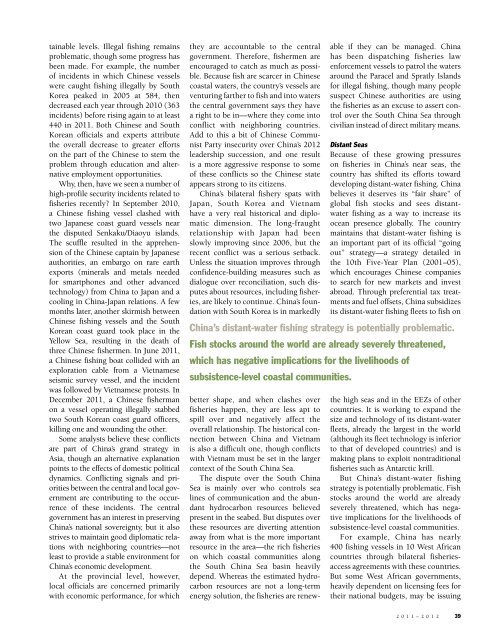Download Current Issue - SAIS
Download Current Issue - SAIS
Download Current Issue - SAIS
Create successful ePaper yourself
Turn your PDF publications into a flip-book with our unique Google optimized e-Paper software.
tainable levels. Illegal fishing remains<br />
problematic, though some progress has<br />
been made. For example, the number<br />
of incidents in which Chinese vessels<br />
were caught fishing illegally by South<br />
Korea peaked in 2005 at 584, then<br />
decreased each year through 2010 (363<br />
incidents) before rising again to at least<br />
440 in 2011. Both Chinese and South<br />
Korean officials and experts attribute<br />
the overall decrease to greater efforts<br />
on the part of the Chinese to stem the<br />
problem through education and alternative<br />
employment opportunities.<br />
Why, then, have we seen a number of<br />
high-profile security incidents related to<br />
fisheries recently? In September 2010,<br />
a Chinese fishing vessel clashed with<br />
two Japanese coast guard vessels near<br />
the disputed Senkaku/Diaoyu islands.<br />
The scuffle resulted in the apprehension<br />
of the Chinese captain by Japanese<br />
authorities, an embargo on rare earth<br />
exports (minerals and metals needed<br />
for smartphones and other advanced<br />
technology) from China to Japan and a<br />
cooling in China-Japan relations. A few<br />
months later, another skirmish between<br />
Chinese fishing vessels and the South<br />
Korean coast guard took place in the<br />
Yellow Sea, resulting in the death of<br />
three Chinese fishermen. In June 2011,<br />
a Chinese fishing boat collided with an<br />
exploration cable from a Vietnamese<br />
seismic survey vessel, and the incident<br />
was followed by Vietnamese protests. In<br />
December 2011, a Chinese fisherman<br />
on a vessel operating illegally stabbed<br />
two South Korean coast guard officers,<br />
killing one and wounding the other.<br />
Some analysts believe these conflicts<br />
are part of China’s grand strategy in<br />
Asia, though an alternative explanation<br />
points to the effects of domestic political<br />
dynamics. Conflicting signals and priorities<br />
between the central and local government<br />
are contributing to the occurrence<br />
of these incidents. The central<br />
government has an interest in preserving<br />
China’s national sovereignty, but it also<br />
strives to maintain good diplomatic relations<br />
with neighboring countries—not<br />
least to provide a stable environment for<br />
China’s economic development.<br />
At the provincial level, however,<br />
local officials are concerned primarily<br />
with economic performance, for which<br />
they are accountable to the central<br />
government. Therefore, fishermen are<br />
encouraged to catch as much as possible.<br />
Because fish are scarcer in Chinese<br />
coastal waters, the country’s vessels are<br />
venturing farther to fish and into waters<br />
the central government says they have<br />
a right to be in—where they come into<br />
conflict with neighboring countries.<br />
Add to this a bit of Chinese Communist<br />
Party insecurity over China’s 2012<br />
leadership succession, and one result<br />
is a more aggressive response to some<br />
of these conflicts so the Chinese state<br />
appears strong to its citizens.<br />
China’s bilateral fishery spats with<br />
Japan, South Korea and Vietnam<br />
have a very real historical and diplomatic<br />
dimension. The long-fraught<br />
relationship with Japan had been<br />
slowly improving since 2006, but the<br />
recent conflict was a serious setback.<br />
Unless the situation improves through<br />
confidence-building measures such as<br />
dialogue over reconciliation, such disputes<br />
about resources, including fisheries,<br />
are likely to continue. China’s foundation<br />
with South Korea is in markedly<br />
better shape, and when clashes over<br />
fisheries happen, they are less apt to<br />
spill over and negatively affect the<br />
overall relationship. The historical connection<br />
between China and Vietnam<br />
is also a difficult one, though conflicts<br />
with Vietnam must be set in the larger<br />
context of the South China Sea.<br />
The dispute over the South China<br />
Sea is mainly over who controls sea<br />
lines of communication and the abundant<br />
hydrocarbon resources believed<br />
present in the seabed. But disputes over<br />
these resources are diverting attention<br />
away from what is the more important<br />
resource in the area—the rich fisheries<br />
on which coastal communities along<br />
the South China Sea basin heavily<br />
depend. Whereas the estimated hydrocarbon<br />
resources are not a long-term<br />
energy solution, the fisheries are renew-<br />
able if they can be managed. China<br />
has been dispatching fisheries law<br />
enforcement vessels to patrol the waters<br />
around the Paracel and Spratly Islands<br />
for illegal fishing, though many people<br />
suspect Chinese authorities are using<br />
the fisheries as an excuse to assert control<br />
over the South China Sea through<br />
civilian instead of direct military means.<br />
Distant Seas<br />
Because of these growing pressures<br />
on fisheries in China’s near seas, the<br />
country has shifted its efforts toward<br />
developing distant-water fishing. China<br />
believes it deserves its “fair share” of<br />
global fish stocks and sees distantwater<br />
fishing as a way to increase its<br />
ocean presence globally. The country<br />
maintains that distant-water fishing is<br />
an important part of its official “going<br />
out” strategy—a strategy detailed in<br />
the 10th Five-Year Plan (2001–05),<br />
which encourages Chinese companies<br />
to search for new markets and invest<br />
abroad. Through preferential tax treatments<br />
and fuel offsets, China subsidizes<br />
its distant-water fishing fleets to fish on<br />
China’s distant-water fishing strategy is potentially problematic.<br />
Fish stocks around the world are already severely threatened,<br />
which has negative implications for the livelihoods of<br />
subsistence-level coastal communities.<br />
the high seas and in the EEZs of other<br />
countries. It is working to expand the<br />
size and technology of its distant-water<br />
fleets, already the largest in the world<br />
(although its fleet technology is inferior<br />
to that of developed countries) and is<br />
making plans to exploit nontraditional<br />
fisheries such as Antarctic krill.<br />
But China’s distant-water fishing<br />
strategy is potentially problematic. Fish<br />
stocks around the world are already<br />
severely threatened, which has negative<br />
implications for the livelihoods of<br />
subsistence-level coastal communities.<br />
For example, China has nearly<br />
400 fishing vessels in 10 West African<br />
countries through bilateral fisheriesaccess<br />
agreements with these countries.<br />
But some West African governments,<br />
heavily dependent on licensing fees for<br />
their national budgets, may be issuing<br />
2011–2012 39



